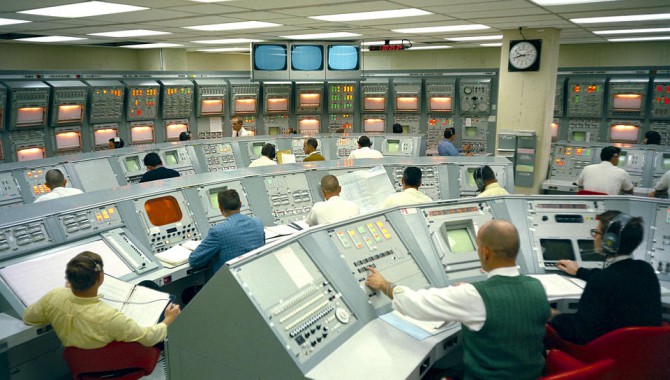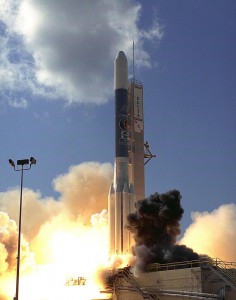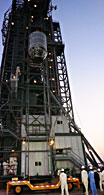
By Frank Snow
It was eight months before launch when my second Flight Operations Team lead said he was leaving the project for another job. Six months earlier, the original lead had said he was leaving. I was stunned — but I remained confident that we would recover. I didn’t expect to lose the second lead. After all, lightning is not supposed to strike twice in the same place. This time, with only eight months until launch, I was very much concerned. No, “concerned” is probably too mild a word. Let’s get it right: I was sweating.
months of each other can definitely shake
the confidence of an inexperienced Flight Ops Team.
Losing a lead at any stage presents problems, but two losses within 6 months of each other can definitely shake the confidence of an inexperienced Flight Ops Team. Immediately after launch the Flight Ops Team would be providing crucial support to two highly professional groups: the flight dynamics engineers at Goddard Space Flight Center, and the Science Team with scientists from many U.S. and European universities. The Flight Ops Team would support the critical orbit and attitude maneuvers needed for the transfer of the Advanced Composition Explorer (ACE) spacecraft to an orbit one million miles from Earth. In addition, the Flight Ops Team would provide the interface with the spacecraft as the scientists activated and calibrated nine sensitive instruments. Many of these scientists had over twenty years of flight hardware experience, and had devoted over five years to the ACE instruments. If the engineers and scientists did not have complete confidence in the abilities of the Flight Ops Team, we would have to delay launch.
Typically, people see the Flight Ops Team as a bunch of desk jockeys who don’t do much more than look at screens, but in reality, after launch, the Flight Ops Team is the first line of defense when things go wrong. Sometimes the team has to make decisions in a matter of minutes, even seconds. They have to decide, “Do I need to do something quickly, or can I wait until I get some additional information and recommendations from the design engineers?” When the Flight Ops Team does react quickly, they depend upon training received during mission simulations, but sometimes an anomaly occurs that cannot be solved with “canned” procedures. In situations like these, you need a Flight Ops Team that can make decisions based upon a fundamental understanding of the spacecraft and how the spacecraft responded to ground testing.
We did several things on the ACE Mission that were new at the time for NASA. One was to bring the Flight Ops lead, and a couple of members of the team, on early. We brought the first lead onto the project 3 years before launch. That was unprecedented in all my years of experience as a Ground Systems Manager. We wanted the lead to participate in the definition, development, integration and testing of the spacecraft, including the nine instruments, and then transfer this knowledge to the rest of the team. We aimed to create a new paradigm with the ACE Flight Ops Team: a team that had experience with the integration and testing of the spacecraft and instruments. In this way, they would be prepared for all spacecraft emergencies, and also provide the other groups in the Mission Operations Team a knowledgeable user-friendly interface with the orbiting spacecraft.
Whom Do I Send To The Plate?
With the loss of the second Flight Ops Team lead, and only eight months to prepare, I had a sinking feeling in my stomach. I was forced to rethink what qualifications I needed for the Flight Ops Team lead. No longer did extensive operational experience seem the one and only prerequisite. I needed someone who could turn eight people into a competent, cohesive, motivated Flight Ops Team and coordinate the activities of the Mission Operation Team, a diverse group of scientists, engineers and technicians. I needed a leader; fortunately for ACE, there was already a member of the Flight Ops Team who could do the job.
Not only was Jeff Volosin very good technically, but he was also respected by the other Flight Ops Team members for his honesty, responsiveness, and dedication to the ACE mission. Jeff’s leadership abilities soon became evident to the other groups in the Mission Operations Team. He not only smoothed the frayed relationships between the Flight Ops Team and the other members of the Mission Operations Team, but he also found creative ways to train the Flight Ops Team.
Members of the Flight Ops Team performed software system testing for the Mission Operations Center, expanded their participation in the testing of the spacecraft, and supported the integration of the instrument test equipment into the Mission Operations Center. These activities provided the Flight Ops Team with invaluable training, while allowing them to develop excellent working relationships with the various operation support teams. In order to handle these additional responsibilities, especially the last two months before launch, the Flight Ops Team worked 10- to 12-hour days and weekends. I never heard any serious complaints about them; as for the attitude of the Flight Ops Team themselves, they saw this difficult task as a unique opportunity.

A Boeing Delta II expendable launch vehicle lifts off with NASA’s ACE observatory at 10:39 a.m. EDT on August 25, 1997.
The greatest reflection of Jeff’s character was that he did all of this and was never in fact the official Flight Ops Team lead. His management told me that Jeff didn’t have the requisite experience to be a lead. Instead, they had someone else they wanted to appoint. “Okay,” I said, the last thing I needed was a fight — but I pushed to have Jeff made the deputy lead. In the end, as I engineered things, the official lead handled the programmatic aspects (meaning the paperwork and whatever other administrative tasks presented themselves) while Jeff was the Chief Operating Officer and handled the personnel.
At launch most of the Flight Ops Team were fresh outs, which means they were coming directly from college or some other job and had no flight operations experience. Jeff trained them to handle almost anything that could happen. They were far better equipped than any Flight Ops Team before them — at least certainly any with whom I had worked. ACE has been a very successful mission, and in no small part, this is due to the Flight Ops Team that has operated it for nearly five years.
Jeff enjoyed his work and strove for excellence in every assignment I gave him. His enthusiasm and dedication were contagious, affecting both the Flight Ops Team and the other groups that worked with him. Recognizing Jeff’s leadership qualities and assigning him the Flight Ops Team lead was one of the best decisions I made during the whole project. He validated my belief that when you have only one out left, you want a leader at the plate.
Lessons:
- Objectives may remain constant — for example, a higher trained Flight Ops Team — but the way to achieve those objectives may need to change as project events dictate. Be flexible in how you approach your objectives.
- Project leaders are not just those with the most technical knowledge. Nurture project leaders who have superior interpersonal skills and can work with teammates to stabilize a project in tense circumstances. During times like these, they will prove more valuable to you than someone with superior technical knowledge.
Question
Do you recall a time on a project when someone with superior interpersonal skills, but not necessarily the best technical skills, was able to lead a project out of a tough situation?
Search by lesson to find more on:
- Leadership










